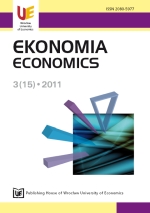THE IMPORTANCE OF HISTORICAL RESEARCH IN THE INSTITUTIONAL ANALYSIS OF THE POLISH TRANSFORMATION AFTER 1989 (BASED ON SOCIAL CAPITAL)
THE IMPORTANCE OF HISTORICAL RESEARCH IN THE INSTITUTIONAL ANALYSIS OF THE POLISH TRANSFORMATION AFTER 1989 (BASED ON SOCIAL CAPITAL)
Author(s): Jędrzej ChumińskiSubject(s): Economy
Published by: Wydawnictwo Uniwersytetu Ekonomicznego we Wrocławiu
Keywords: SOCIAL CAPITAL; TOTALITARIANISM; SECURITY APPARATUS IN COMMUNIST POLAND; SOCIAL ACTIVITY
Summary/Abstract: The disintegration of the USSR and the fall of communism has initiated a process of transition between the system of the so-called real socialism to the democratic system and free market economy in the countries of the former Eastern Bloc. This transition has become an object of careful studies led by specialists of various scientific fields: economists, sociologists, social psychologists These analyses, however interesting, are often abstracted from the historical conditions of the studied phenomena and processes. The studies on the social capital deficit in Polish society are a good example. The article will attempt to disclose the historically conditioned factors impacting the low level of social capital in the country, especially in the time of the People’s Republic of Poland, where the apparatus of repression played a significant role.
Journal: Ekonomia
- Issue Year: 2011
- Issue No: 15
- Page Range: 123-142
- Page Count: 20
- Language: English

